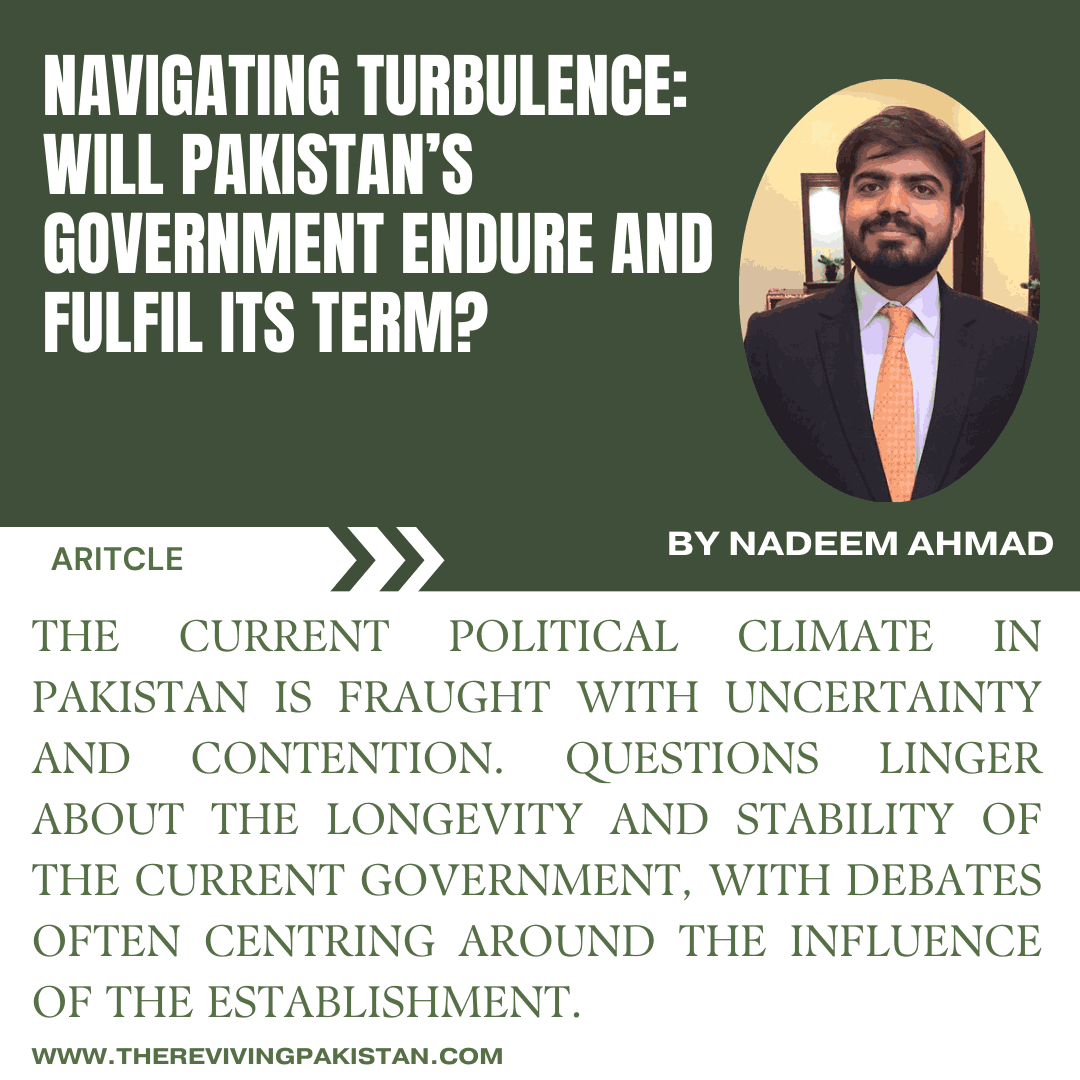About the Author(s)

Nadeem Ahmad Bugti
The author is a graduate with a Bachelor’s degree in International Relations. He have a strong interest in both international and local politics and occasionally write about political issues, climate change, and the Sustainable Development Goals (SDGs). Through his writing, he aim to contribute to meaningful discussions and reflect on the challenges our world faces today.
The current political climate in Pakistan is fraught with uncertainty and contention. Questions linger about the longevity and stability of the current government, with debates often centring around the influence of the establishment. However, today’s discussion will focus on whether the government will survive and complete its tenure or if history will once again repeat itself. Several critical issues are at the forefront: the incarceration of Imran Khan, the pervasive role of the establishment, the struggling economy, ongoing IMF deals, and widespread human rights violations. To understand these challenges in their full context, it is essential to delve deeper into Pakistan’s historical patterns of governance, the persistent economic issues, and the broader implications of the nation’s foreign relations.
Since its inception in 1947, Pakistan has faced a tumultuous political landscape. The establishment, particularly the military, has played a pivotal role in shaping the country’s political trajectory. The military’s involvement in politics began soon after independence, culminating in the first military coup in 1958. This intervention set a precedent, and since then, no prime minister in Pakistan has ever completed their tenure, often due to either direct or indirect influence from the establishment or judiciary. This pattern has stifled the growth of democratic institutions, creating an environment where political instability is almost normalized.
The establishment’s influence is not solely a matter of historical interest but remains highly relevant today. The recent incarceration of Imran Khan, the most prominent and influential political leader in Pakistan today, highlights the ongoing tussle between elected representatives and the establishment. His imprisonment appears to be driven by the short-term gains and ego satisfaction of the Pakistan Muslim League-Nawaz (PML-N) leadership. This has inadvertently increased his popularity and brought his political stance into sharper focus. As a result, political stability in Pakistan has been severely compromised, affecting the nation as a whole. The detention of a leader with such substantial public support has not only polarized the populace but also exacerbated the existing political volatility.
The relationship between the establishment and the judiciary has also been a significant factor in Pakistan’s political instability. The judiciary, which should ideally serve as a check on both the executive and the military, has often been perceived as complicit in the establishment’s agenda. The dismissal of elected governments through judicial interventions has further eroded the credibility of democratic processes in Pakistan. For Pakistan to move forward, there must be a clear delineation of roles, with the establishment focusing on its constitutional responsibilities and allowing the democratic process to function without undue interference.
A nation’s economy is its backbone, and Pakistan’s economic situation is dire. Successive governments have prioritized their political careers over the welfare of the people, resulting in poor economic management. Pakistan’s reliance on IMF programs and external loans underscores the fragility of its economy. The recent conclusion of an agreement with the IMF and the initiation of a new one highlight the country’s desperate need for financial stability. Political instability, human rights violations, and terrorism further exacerbate economic instability. Without a coherent and long-term economic strategy, Pakistan’s economic woes are likely to persist, impacting the quality of life for its citizens.
The persistent economic challenges faced by Pakistan can be traced back to the structural issues in its economy. The over-reliance on agriculture, which employs a significant portion of the population but contributes less than a quarter to the GDP, is a major concern. Industrial growth has been stunted by energy shortages, poor infrastructure, and inconsistent policies. Moreover, the tax base in Pakistan is extremely narrow, with a large portion of the economy remaining undocumented. This has resulted in a chronic budget deficit, necessitating repeated bailouts from the IMF.
Pakistan’s engagement with the International Monetary Fund (IMF) has been a constant over the years, reflecting the country’s ongoing economic struggles. The end of one IMF agreement and the swift commencement of another is a testament to Pakistan’s financial dependency. While these deals provide temporary relief, they also come with stringent conditions that often lead to austerity measures, affecting the poorest segments of society the most. The recurring reliance on IMF support underscores the need for structural economic reforms and a sustainable economic strategy that can steer the country toward self-sufficiency.
The implementation of IMF-mandated austerity measures has often led to public discontent, further destabilizing the political environment. Subsidies on essential commodities are slashed, taxes are raised, and public sector wages are frozen, all of which disproportionately affect the lower and middle classes. The government faces a delicate balancing act: implementing necessary economic reforms while maintaining social stability. However, without addressing the root causes of economic malaise, such as corruption, inefficiency, and a lack of investment in education and health, these IMF programs will only offer temporary reprieve.
Human rights violations in Pakistan present a complex and multifaceted challenge. Grievances related to issues of governance, security, and justice are widespread across various regions, reflecting deep-seated frustrations with the state’s ability to protect and uphold citizens’ rights. In areas like Balochistan, these grievances are often compounded by ongoing security concerns, including the resurgence of terrorism. The region has witnessed a rise in militant activities, which not only threatens the safety of residents but also hampers development efforts. Addressing these issues requires a balanced approach that both respects human rights and effectively counters terrorism, ensuring long-term stability.
Pakistan’s foreign relations are intricately linked to its domestic stability. As a key player in regional and global politics, Pakistan’s interactions with major powers and neighbouring countries significantly impact its internal dynamics. Relations with countries like the United States, China, and India are crucial, as they influence everything from economic aid to security policies. However, these relationships are often a balancing act, requiring Pakistan to navigate complex geopolitical landscapes while safeguarding its own national interests. Maintaining stable and beneficial foreign relations is essential for Pakistan’s economic growth and security, but it must be done without compromising its sovereignty or exacerbating internal divisions.
Pakistan cannot afford political instability. To navigate its myriad challenges, a unified approach is essential. Leaders must prioritize national interests over personal or institutional gains, focusing on long-term policies that can help Pakistan bid farewell to IMF programs and improve its economic system. Every institution must operate within its constitutional domain, free from undue influence, to foster a stable and democratic society. By working together, Pakistan’s leaders can steer the country towards a more prosperous and stable future, ensuring that the government not only survives but thrives, completing its tenure for the benefit of all its citizens.
In conclusion, the challenges facing Pakistan are deeply interwoven, requiring a holistic approach that addresses the root causes of instability. From the role of the establishment in political affairs to the dire economic situation and human rights concerns, each issue must be tackled with a clear and consistent strategy. Only then can Pakistan hope to break the cycle of instability and move towards a more democratic and prosperous future.

